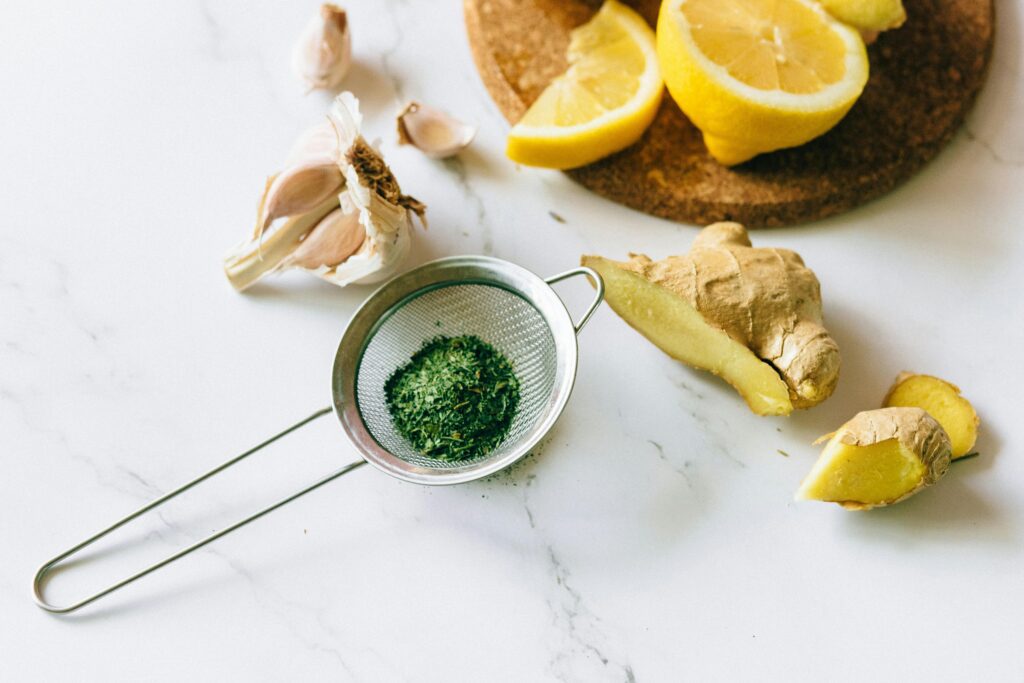Is Your Gut Functioning Optimally? 10 Telling Signs It May Not Be

Not sure if you have an unhealthy gut? You’ve come to the right place. Digestive issues are often signs of an unhealthy gut, and the more we experience them, the less robust our digestive system becomes. The most common symptoms include constipation, food intolerance, bloating, cramping, diarrhea, gas, and nausea.
I personally experienced stomach problems for years. Even as a nurse I had no idea that there could be something underlying besides just IBS (Irritable bowel syndrome.) I spent years just accepting my fate of tummy troubles and not considering – my gut was unhealthy.
In recent years this has become a hot conversation, especially in the holistic world. Symptoms experienced in other areas of the body were not considered an effect of digestive health. Now we know better and believe that the gut is the gateway to overall health. Bad gut health can lead to many issues outside of just digestive problems.

Food Intolerance
Have you ever eaten something one day and felt fine and then the next you felt sick or had to run to the bathroom? This is food intolerance or stomach problems after eating. It can be random or all the time. Basically what happens is the bacteria in the gut is unable to break down the foods consumed. Some people experience bloating, constipation, diarrhea, gas or nausea. These are the more obvious symptoms.
Food intolerance can also force us into following restrictive diets. When we’re limited to eating only certain foods due to immune reactions, this often points back to an imbalanced gut. Most people should be able to digest whole nutrient rich foods.
Food intolerance can present in other areas of the body. There is a lining in the gut that protects the rest of the body from particles and proteins entering the bloodstream. When this is broken down (what many call “leaky gut”), these proteins enter and can cause havoc. This can look like a number of symptoms and can lead to disease.
What might be happening: Your gut microbiome is likely lacking diversity or has an overgrowth of certain bacteria. Without the right balance of gut bacteria, certain foods become difficult to break down properly.
Bloating/Gas
Occasional bloating can happen to anyone. If you eat a big bowl of broccoli you may feel bloated after eating, especially if you aren’t used to eating this everyday. This is normal and easy to identify. On the other spectrum, if you are bloating after eating and feeling like a balloon after most meals this is something to look into.
Let me share my personal experience with this. I used to always feel this way after eating. I would need to lay down and I would ask others if they felt sick and sadly I was the only one. I felt so uncomfortable and would need to unzip my jeans and wait for it to pass. This isn’t normal but most people just live with it.
Chronic belly bloat is usually a result of imbalance in the digestive tract. We have trillions of bacteria that live there. These bacteria need to be fed a wide variety of foods, especially fruits and vegetables, they thrive off of this. If we eat the same diet all of the time these bacteria don’t do as well and can even die off. When we eat foods that need specific bacteria to digest these foods it puts off gas leading to a gassy stomach.
Another reason can be linked to a poor diet. If you are eating fast food, lots of processed foods, soda, and candy this is not going to fuel your gut. It will throw off the bacteria making it hard to digest normal healthy foods.
Quick relief tip: Try sipping on ginger or peppermint tea after meals. Both have natural anti-inflammatory properties that can help reduce bloating. For a long-term solution, gradually increasing your intake of diverse plant foods can help build a more resilient gut microbiome.
Skin Issues
Surprisingly, skin issues are often linked to gut health. While this connection might not seem obvious at first (I certainly didn’t see it), it all goes back to the gut barrier lining. When the gut lining is impaired the food particles and proteins can get into our bloodstream. They are not meant to be there. The more this happens it weakens the lining letting more foreign invaders in.
The immune system may attack and signal a response. This response can present in many areas in the body. With skin this can present as a rash, eczema or psoriasis. The key is to figure out the root cause to clear up the skin. This gut-skin connection (sometimes called the “gut-skin axis”) is becoming more recognized in both conventional and holistic medicine.

Joint Pain/Gout/Arthritis
Joint pain is often linked to old age. We may think we wore out our joints, which can happen with extra use. However when joint pain or arthritis is random or linked to autoimmune disease it typically is not just from overuse. There’s more to the story than just wear and tear.
When the gut lining is permeable these “foreign invaders” as already mentioned can affect our joints and lead to joint pain, arthritis and gout. This partly depends on the foods we eat and how damaged the gut lining is. Some foods are more offensive than others.
I used to have terrible pain in my hands and feet due to my gut being a mess. With time and healing I was able to resolve this and haven’t noticed pain since. If we let this go it can turn into arthritis or other joint issues making it difficult to resolve.

Headaches
Headaches are another result of poor gut health. Headaches can occur due to the inability to properly digest foods. If we don’t have the necessary bacteria to digest it can lead to bloating and gas and turn into headaches as well.
Certain foods that contain more histamine are linked to headaches too. When someone has histamine intolerance those foods with more histamine can trigger a reaction. Histamine intolerance is usually resolved with healing the gut.
Something I discovered in my own journey is that dehydration often compounds gut-related headaches. I used to get headaches everyday. Hydration was part of the solutions to overcome them. When your digestion is compromised, staying well-hydrated becomes even more crucial for preventing those pounding headaches that seem to come out of nowhere.
Hormone Imbalance – (missed periods, unexplained weight gain, hot flashes, infertility)
Gut issues and hormone imbalance go together like peanut butter and jelly – you rarely see one without the other. This can present in many ways such as infertility, irregular periods, hot flashes, inability to lose weight, extra hair growth and so on.
When we consume ultra processed foods with unnatural ingredients and use toxic products this can alter our hormones which can change our digestive system. Hormones are produced in the gut. It’s one of the largest areas for hormone production.
The digestive system is the largest endocrine system in the body. This is why it’s imperative to feed ourselves necessary nutrients and whole healthy foods.
What surprised me most during my gut healing journey was how my hormone-related symptoms stabilized. When I was in my early twenties my testosterone and aldosterone was way out of range. After changing my lifestyle and diet my levels were no longer out of range. I had happy hormones that didn’t fall under the diagnosis of PCOS (Polycystic Ovarian Syndrome.) The connection is real, and addressing gut health can be transformative for hormonal wellbeing.
Low Immune System
If you find yourself catching every cold that comes around, your gut health might be the culprit. Not only are hormones produced in the gut, but research shows that 70% of our immune system resides there. That is a large chunk of it. If the gut is not thriving most likely our immune system is not either and it becomes easier to catch flu symptoms.
Another indicator of a low immune system can be through a blood test called a white blood count. White blood cells help fight off invaders. If the white count is too low this indicates a lowered immune system and less help to fight off sickness when we come in contact.
By boosting the gut with plants, whole foods, healthy proteins, and vital nutrients it can thrive along with the immune system. Having a healthy digestive system puts our immune systems in line to do the same, warding off illness and sickness.
Immune-boosting tip: Fermented foods like sauerkraut, kimchi, and kefir introduce beneficial bacteria directly into your gut. Starting with just a tablespoon daily and gradually increasing can help build your gut flora and strengthen your immune response.

Constipation/Diarrhea
While Johns Hopkins defines constipation as having three or fewer bowel movements per week, in my experience as a nurse, any difficulty with daily bowel movements can signal an issue. What contributes to constipation is not eating enough fiber, lack of hydration and not eating enough food to push things along.
Another factor may be peristalsis. This is when the digestive tract is slow and stool can back up. If we aren’t excreting regularly then we are holding onto toxins. These toxins can change the gut makeup and affect other areas of our body. This results in a less than optimal digestive system and can lead to extreme constipation.
Everyone has probably experienced food poisoning at some point or ate too much fiber and had diarrhea. This can happen to anyone. When chronic diarrhea happens on a regular basis it can occur from eating too much processed fatty foods as well as not having enough good bacteria to help digestion.
Another cause can be due to a decrease in bile or enzymes that are necessary to break down fat. If there isn’t enough bile or enzymes to break down the fats and other nutrients the food is not broken down enough leading to diarrhea.
Constipation and diarrhea may arise interchangeably. Living with these symptoms isn’t something you just have to accept – I learned that the hard way. As someone who spent years dismissing my own gut issues, I know how frustrating and isolating these symptoms can feel.
During my worst gut health days, I found gentle movement like walking after meals and specific yoga poses (like child’s pose and gentle twists) incredibly helpful for regulating bowel movements. These simple practices stimulate the vagus nerve, which plays a key role in proper digestion.
Brain Fog and Mood Changes
One symptom I didn’t initially connect to my gut was the mental cloudiness I experienced. Some days, I felt like I was thinking through mud – forgetful, unfocused, and mentally sluggish were a few of the brain fog symptoms I experienced. We now know about the gut-brain axis, the two-way communication system between our digestive tract and brain.
When gut bacteria are imbalanced, they can produce compounds that affect brain function. Depression, anxiety, and mood swings can all be influenced by what’s happening in our gut. I noticed that when my digestion improved, my mental clarity and emotional stability improved too.
The science behind this is fascinating – about 95% of your body’s serotonin (the “happy chemical”) is produced in your gut, not your brain! That’s why addressing gut health can do more for your mood than focusing solely on mental health approaches.
Sleep Disturbances
Tossing and turning all night? Your gut might be involved here too. Poor gut health can interfere with your body’s production of melatonin and serotonin, both crucial for sound sleep.
The connection makes sense – if your body is dealing with inflammation and digestive distress, it’s harder to settle into restful sleep.
Simple evening practices like avoiding heavy meals close to bedtime and sipping chamomile tea (which has gentle anti-inflammatory properties) can support both gut health and better sleep quality.

Conclusion
Understanding that these seemingly unrelated problems might stem from gut health is the first step toward feeling better. Your body is incredibly resilient, and with the right support, your gut can heal!
The journey to better gut health isn’t a quick fix – it took me months of consistent effort to see lasting changes. But the improvements in energy, mental clarity, and overall wellbeing made every step worthwhile. Small changes add up to big results when it comes to gut healing.
Remember, you’re not alone in this journey – let’s work on thriving together! If you’ve been dealing with any of these symptoms, I’d love to hear your story in the comments below.
What gut-health strategies have worked for you?